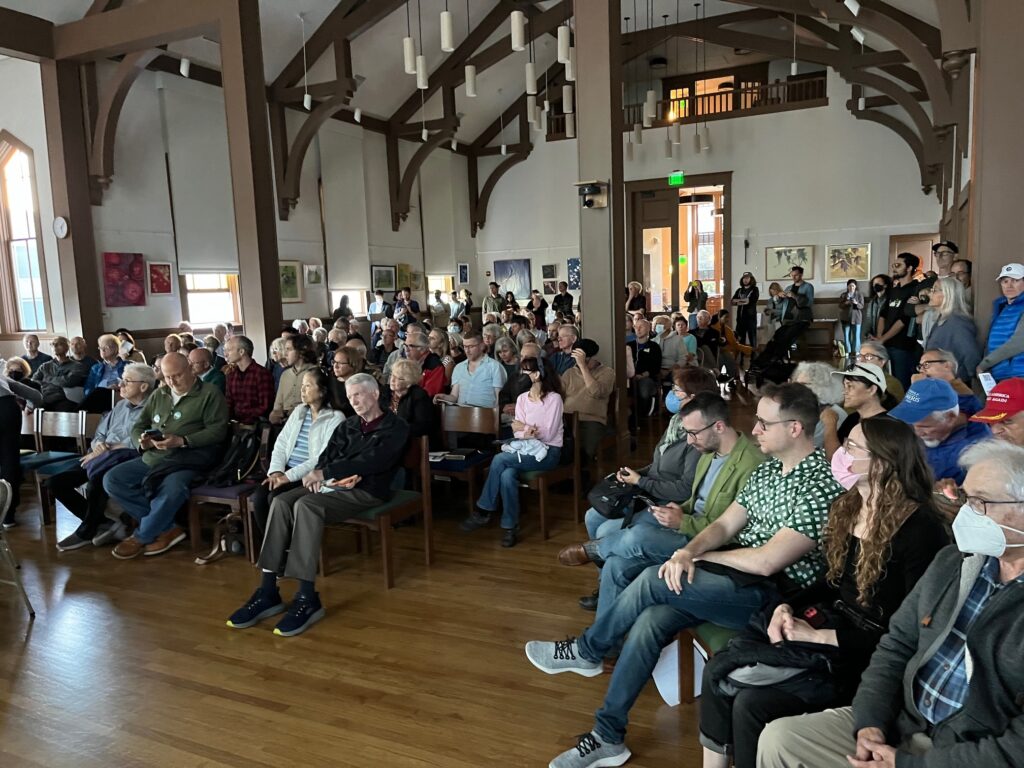At least 200 people, maybe 250, packed a town hall meeting in Noe Valley Monday night to hear about Mayor London Breed’s plans for upzoning neighborhood commercial corridors.
Katherine Petrin, an architectural historian, explained the history of the state mandating that San Francisco approve (and issue building permits for) 82,000 new housing units in the next six years, 46,000 of them affordable.
The slides she presented showed how dramatic the changes to the neighborhoods might be if developers built to the new height limits. She also talked about the impact on community-serving businesses: Since most of the sites in the corridors that will allow taller new buildings already have existing buildings, the proposal would require substantial demolitions—and the existing businesses would most likely be displaced, never to come back. The new housing created by for-profit developers will never be affordable to the majority of the San Francisco workforce.

All of this is information we have written about repeatedly.
But Petrin also raised another question:
Building 46,000 new units of affordable housing will cost San Francisco $19 billion. The state has offered essentially nothing to help out.
That could be, Petrin said, an “unfunded mandate”—it’s illegal in California for the state to tell local governments they have to do something expensive unless the state will pay for it.
In 1979, the voters enshrined in the state Constitution the concept that anything Sacramento tells local government to do that costs money, the state has to pay for.
The courts have upheld the ban on unfunded local mandates repeatedly.
The truth is, San Francisco probably could build, or at least get started, 46,000 units in the next few years. This city has a very robust affordable housing infrastructure, with community-based nonprofits that have proven records of developing non-market housing.
The problem has nothing to do with zoning or Nimbys at this point; it’s all about money. The regional housing bond could have provided enough for a very good start, but the folks running that, for reasons I have never understood, pulled it.
So: The state wants SF to build 46,000 units of affordable housing, and is prepared to levy sanctions that will cost the city millions of dollars if it doesn’t happen. Some are saying that the state just has to provide the money.
“I have always thought that was a strong legal argument,” Sup. Aaron Peskin, who is running for mayor, told me.
If that’s true, and someone were to make that legal argument effectively, it could undermine the entire Regional Housing Needs Assessment process and all these state laws eliminating local control over housing.
The problem: Who could actually sue the state to either overturn the RHNA mandates, which everyone with any sense knows SF can never possibly meet?
That gets into a complicated legal question called “standing.”
You can’t just sue because you don’t like something. You have to prove that you could be damaged by it.
And the only entity in this city that has a good claim to being damaged by the RHNA process is the City and County of San Francisco.
And the only person in the City and County of San Francisco who could sue the state and demand that money is City Attorney David Chiu, who I’m sure will never do it.
Chiu has long sided with the Yimby movement that supports the state mandates. So has the mayor.
I don’t know where this ends, but I do know that it’s a complete fantasy to think that upzoning neighborhood will create 46,000 units of housing affordable to the local workforce in the next six years.
That means the state may take away millions of dollars in affordable housing and transit money. And Breed and Chiu don’t seem to be interested in doing anything about it.





